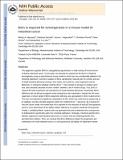Bmi1 is required for tumorigenesis in a mouse model of intestinal cancer
Author(s)
Maynard, Mindy; Perret, C.; Whyte, P.; Ferretti, Roberta; Lees, Jacqueline; Hilgendorf, K. I.; ... Show more Show less
DownloadLees_Bmi1 is required.pdf (817.8Kb)
OPEN_ACCESS_POLICY
Open Access Policy
Creative Commons Attribution-Noncommercial-Share Alike
Terms of use
Metadata
Show full item recordAbstract
The epigenetic regulator BMI1 is upregulated progressively in a wide variety of human tumors including colorectal cancer. In this study, we assessed the requirement for Bmi1 in intestinal tumorigenesis using an autochthonous mouse model in which Apc was conditionally ablated in the intestinal epithelium. Germline mutation of Bmi1 significantly reduced both the number and size of small intestinal adenomas arising in this model, and it acted in a dose-dependent manner. Moreover, in contrast to wild-type controls, Bmi1[superscript −/−] mice showed no increase in median tumor size, and a dramatic decrease in tumor number, between 3 and 4 months of age. Thus, Bmi1 is required for both progression and maintenance of small intestinal adenomas. Importantly, Bmi1 deficiency did not disrupt oncogenic events arising from Apc inactivation. Instead, the Arf tumor suppressor, a known target of Bmi1 epigenetic silencing, was upregulated in Bmi1 mutant tumors. This was accompanied by significant upregulation of p53, which was confirmed by sequencing to be wild-type, and also elevated apoptosis within the smallest Bmi1[superscript −/−] adenomas. By crossing Arf into this cancer model, we showed that Arf is required for the induction of both p53 and apoptosis, and it is a key determinant of the ability of Bmi1 deficiency to suppress intestinal tumorigenesis. Finally, a conditional Bmi1 mutant strain was generated and used to determine the consequences of deleting Bmi1 specifically within the intestinal epithelium. Strikingly, intestinal-specific Bmi1 deletion suppressed small intestinal adenomas in a manner that was indistinguishable from germline Bmi1 deletion. Thus, we conclude that Bmi1 deficiency impairs the progression and maintenance of small intestinal tumors in a cell autonomous and highly Arf-dependent manner.
Date issued
2013-08Department
Massachusetts Institute of Technology. Department of Biology; Koch Institute for Integrative Cancer Research at MITJournal
Oncogene
Publisher
Nature Publishing Group
Citation
Maynard, M A, R Ferretti, K I Hilgendorf, C Perret, P Whyte, and J A Lees. “Bmi1 Is Required for Tumorigenesis in a Mouse Model of Intestinal Cancer.” Oncogene 33, no. 28 (August 19, 2013): 3742–3747.
Version: Author's final manuscript
ISSN
0950-9232
1476-5594